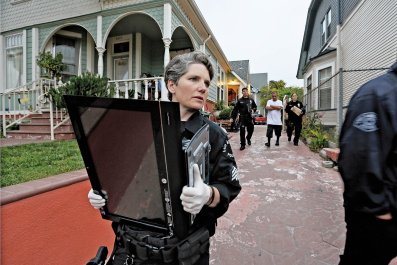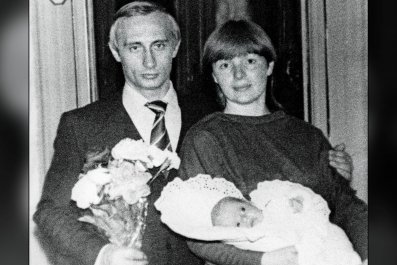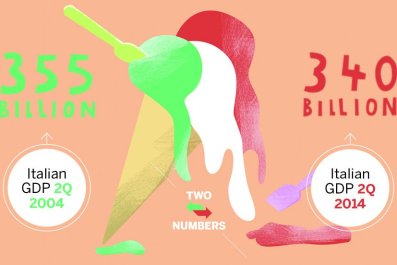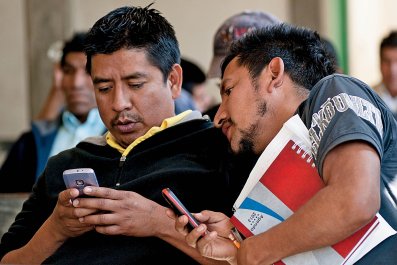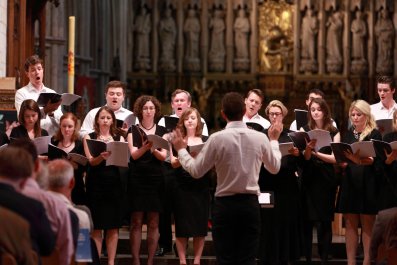Can the Internet let you live forever? Johnny Depp tried it in the box-office bomb Transcendence, and now a new website suggests you "simply become immortal." Eterni.me, a startup launched early this year, promises to create a "virtual you" that will interact with your descendants long after you're dead. The company envisions a future in which it's as easy to talk to a deceased family member as it is to chat with a living next-door neighbor, using existing digital tools.
By distilling all of the information people put online in the form of emails, Facebook updates and tweets, Eterni.me will help users "curate your legacy for the future" in the form of a virtual avatar that will mimic your appearance and mannerisms, according to Eterni.me co-founder and CEO Marius Ursache.
Inspired by the science fiction novels of Isaac Asimov and Philip K. Dick, as well as the online video game Second Life, the company came together at the Massachusetts Institute of Technology's Entrepreneurial Development Program, where Ursache first pitched the concept. "It was the craziest out of the 130 ideas that were presented, but it got the highest score," he says. "I realized that it's a very valid product." The notion has a visceral appeal that proved immediately popular—who wouldn't want to achieve digital immortality? In its first two days, Eterni.me's website attracted 3,000 subscribers and has reached over 22,000 since then.
Eterni.me is a logical extension of the technological shift moving more aspects of our lives online; if we shop for groceries and find romance via the Internet, why not deal with death virtually as well? Sites such as Eterni.me are pioneering a new form of mourning. "When someone dies, it doesn't necessarily stop a person's desire to talk with that person," says Siena College professor Carla Sofka, a grief expert. "In the old days, we used to talk to a picture or go to a cemetery. Now technology is giving us all these new ways to do that."
But should we really be chatting with the dead online? "Some people could absolutely love this," Sofka says. "For others, it could send them into a tailspin."
The Facebook Graveyard
When Michael Kibbee realized he was dying of Hodgkin's disease, he launched the World Wide Cemetery in 1995, perhaps the world's first online memorial site, or cyber graveyard. The site was designed to host short profiles of the deceased, including photos, videos and comments left by mourners. The early website had a major advantage: "A physical monument can't be visited by people worldwide," the founder told The Philadelphia Inquirer. Kibbee died in 1997, but the website remains online—some memorials were even added this year.
Newer websites have picked up on the communal mourning concept. In Hong Kong, a shortage of usable burial space on the island prompted the creation in 2010 of Memorial.gov.hk, the world's first government-run cyber graveyard. The site was created as a way to encourage cremation and "promote sustainable forms of mourning and burial," says former Hong Kong cemetery official Cheuk Wing-hing. By November 2012, over 4,500 users were registered on the memorial service, 4,900 memorial web pages were created and the site was visited over a million times according to a government representative.
Like selecting a style of tombstone for a grave, there are a variety of cyber monuments to choose from. The Chinese virtual graveyard 00tang.com allows users to create virtual temples dedicated to the deceased, as well as leave digital offerings that range from incense to pixel effigies of consumer electronics and sports cars. Other options include the Polish Virtual Graveyard, a Gothic-style website with atmospheric weather options; I-tomb.net, which situates itself in outer space; and Rememberum, a minimalist memorial startup.
But the world's largest cyber graveyard might be one we already know quite well. Facebook, with its billion-plus users, contains over 30 million accounts of dead people. Eight thousand users die every day. In order to deal with this morbid turnover, Facebook launched its memorial service in 2009, a process that locks a deceased user's profile and turns it into an enduring shrine. It's still possible to leave comments and send private messages for the dead. These digital prayers "re-create mourning rituals in cyberspace," Sofka says.
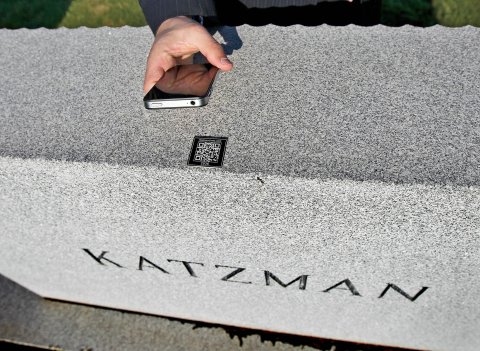
Bytes of Stone
If you're looking for immortality, however, websites might not be the way to go. Unlike actual gravestones, the tech companies that run cyber graveyards come and go, folding or failing to do upkeep the memorials in their charge. In that case, why not bring advances in grieving technology to the stone itself?
David Quiring's family has been in the gravestone business for over a century with their Seattle-based business, Quiring Monuments. But at the ripe old age of 71, Quiring is using his company to create new, technologically augmented memorials to help people mourn better. "That's what my quest has been: a way to help folks through the grieving process and help families connect as much as possible," he says.
His solution is the "Living Headstone," a slab with a QR code fixed to its surface that, when scanned with a smartphone, takes the viewer to a website for the deceased. It's a cyber graveyard attached to a real one. Over the past two years, the company has distributed around 800 of the QR codes for graves around the world, Quiring estimates. The system costs $75 with a Quiring Monuments gravestone and $150 to add to a pre-existing gravestone. It's a small addition to the company's $10 million annual revenue but a growing one.
Americans are "death deniers—we don't want to talk about it," Quiring says. By allowing people to create their own profiles, stocking them with images and text and creating a legacy before they die, Quiring hopes to make death easier to process. In fact, like the Hair Club for Men guy, he is not just the president but a client. "I'm in the process of making a profile for myself right now," he explains. "I want to write my biography, and I'll leave that there; and sometime down the line, my wife and kids will add to it, and somebody will be able to see a whole story. We can leave a message, not in a bottle but on the Web."
If Quiring's Living Headstone products bring families together in grief, the Austrian online memorial company Aspetos has created a system that taps into the strength of communities to comfort mourners. In Austria, the government mandates a funeral within five days of death. When Aspetos co-founder Jörg Bauer's mother passed away, he found himself in charge of her funeral and rushed to get everything in order before the deadline. After the dust settled, Bauer began to look online for resources to deal with his grief and found "nearly nothing," he says. In 2009 Bauer started the company to fill that need.
Aspetos works in the physical world as much as the virtual. The company finds the best funeral homes in Austria based on customer feedback and collaborates with them. The funeral homes pay a monthly fee to bundle online memorials, complete with gravestone QR codes, into the burial services they offer, making it easier to adopt technology that might be intimidating otherwise. Aspetos's profiles are public, leading to a sense of shared grief. "If a child from one side of the country dies, people from the other side of Austria write in," Bauer says. "People want a social experience."
Aspetos's Austria portal gets 500,000 unique visits a month, with 99 percent local visitors. In 2013, Aspetos expanded into Germany, and though the new portal receives only 100,000 visitors a month, the monthly income from virtual candle sales and donations already exceeds $13,000. Yet Bauer doesn't see his online mourning platform replacing physical gravestones anytime soon. "We need the grave—you need the physical point where your people are," he emphasized. The Internet "can only be a longer arm."
Modern Stone-Age Family
Gravestones may not be going anywhere soon—the permanent technological solution of sticking a stone inscribed with a name and a date in the ground is just too good. In fact, it has been the memorial of choice since the burial mounds of the Bronze Age through to the Egyptian pyramids and the world's oldest, continuously operating cemetery, Iraq's 1,400-year-old Wadi al-Salaam, or Valley of Peace, which holds 600,000 bodies in a sand-colored city of stone.
Whether it's a virtual avatar or a gravestone, "for most people it's about the fear of being forgotten," says Ursache. Software to organize your digital afterlife is "a necessary product in the Internet age. The biggest challenge is making sense of all that data left behind." We hope that technology might save us from that fundamental fear, but salvation isn't likely.
"Technology cannot add meaning; it needs your help quite a lot," Ursache says. "We've had people who are terminally ill who are just begging us, asking, When are we going to be able to use this? They want to leave something behind, and it's really sad that we have to tell them that this product will take another two years to become publicly available." Today's artificial intelligence technology is still too primitive to realistically represent a human being—the Turing Test, which judges how believably a computer can imitate a person through a text chat, may have been beaten this year, but the most successful program could only simulate a 13-year-old boy. It will also take time to load data into Eterni.me's system. Ideally, the program's users would teach it to simulate them over the course of 30 or 40 years.
Yet perhaps it's a good thing that we can't achieve digital immortality just yet, when humanity hasn't even had time to adjust to the rise of social networking during our lifetimes. "Sometimes technology gets used before people anticipate all of the consequences, and that's where it becomes a problem," says Sofka. The risk is that we might become obsessed with avatars like those Eterni.me is planning.
"In the vast majority of cases, [online memorials] will facilitate the grieving process," says Camille Wortman, a psychology professor at Duke University. "However, if someone focuses primarily on talking to the deceased to the exclusion of other coping strategies…then that person may become stuck in their grief."
"Cyberspace doesn't put a time limit on how you can grieve," Sofka says. The Internet, rather than solving death, may simply intensify our obsession with cheating it.
Technology seems to make bringing the past closer to the present inevitable. "Our audacious goal is to create a library of a full generation of people, to preserve the knowledge of humanity for eternity," Ursache says. "It's a big dream, but I think in 50 or 100 years this will be something that's absolutely normal."







